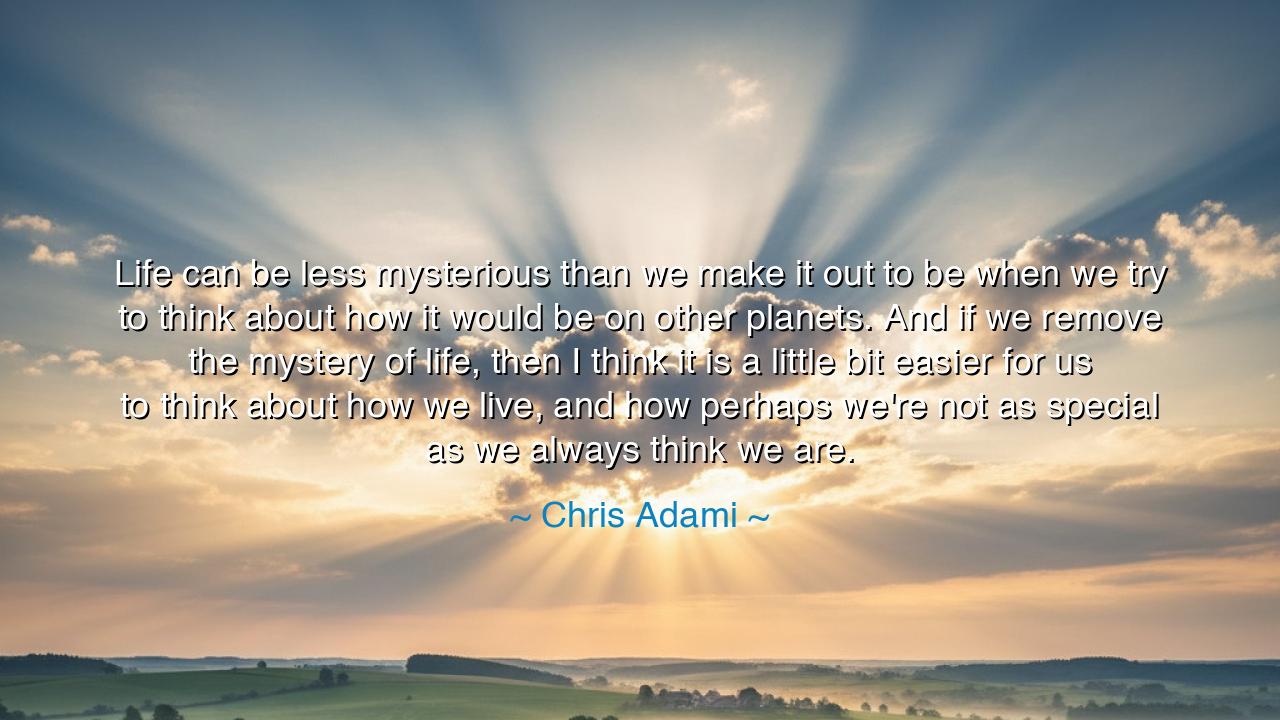
Life can be less mysterious than we make it out to be when we try
Life can be less mysterious than we make it out to be when we try to think about how it would be on other planets. And if we remove the mystery of life, then I think it is a little bit easier for us to think about how we live, and how perhaps we're not as special as we always think we are.






"Life can be less mysterious than we make it out to be when we try to think about how it would be on other planets. And if we remove the mystery of life, then I think it is a little bit easier for us to think about how we live, and how perhaps we're not as special as we always think we are." — these words from Chris Adami delve into the essence of human nature, the mystery of existence, and our perception of our place in the universe. Adami speaks of the tendency for mystery to cloud our understanding of life, and how, when we imagine life beyond our planet, we realize that we are not as unique or as exceptional as we often believe. Life, as complex and mysterious as it seems on Earth, may not be as distant from the cosmos as we think, and in recognizing this, we are reminded of the larger universe we inhabit. Humanity, despite its grandeur, is but a small part of a vast, interconnected existence.
In the ancient world, thinkers often grappled with the mystery of life and existence. The Greeks were among the first to wrestle with questions about the nature of life, the cosmos, and humanity’s place in it. Socrates, with his famous declaration that "the unexamined life is not worth living," urged his followers to seek understanding, to peel back the layers of mystery in pursuit of wisdom. Plato, his disciple, imagined a world where human beings were not at the center of existence, but part of a grand cosmic order. In his Allegory of the Cave, Plato illustrated that the world outside the cave—the world of light—was far beyond the limited perceptions of the prisoners inside. To step outside was to remove the mystery of the shadows and understand the greater reality of the universe.
However, Adami’s words challenge us further to expand our understanding of life. The mystery of existence may not be as grand as we make it out to be. By imagining life on other planets, we push our thinking beyond the narrow confines of Earth-bound existence. It forces us to consider that life—in all its forms—might exist in a way we cannot yet comprehend. Just as Plato envisioned a reality beyond the cave, Adami suggests that by removing the mystery surrounding life, we come to the humbling realization that humanity is not the pinnacle of existence. This profound shift in perspective is not just an intellectual exercise but a call to understand how we live, to reflect on our place in the cosmic order, and perhaps, to recognize that we are part of a much greater whole.
Throughout history, there have been moments when humanity has faced similar realizations. One such moment occurred in the 16th century with the work of Nicolaus Copernicus, who proposed the heliocentric model of the universe, challenging the long-held belief that Earth was the center of the cosmos. This revolutionary idea removed the mystery surrounding our place in the universe, suggesting that Earth was not the center but merely a planet orbiting the Sun, just like countless others in the vast universe. Copernicus' discovery fundamentally altered humanity's perception of itself, and we have been re-evaluating our place in the cosmos ever since. The notion that humankind was no longer the center of creation was a humbling yet liberating realization that sparked a deeper search for truth.
Adami's reflection encourages us to see the mystery of life not as a barrier but as a doorway. The more we understand the universe, the more we can understand ourselves. If we acknowledge that life is not as mysterious as we make it out to be, we might come to terms with the fact that our identity, our place in the world, and our purpose are not as singular as we once believed. Just as Copernicus’ model shifted our view of the universe, so too does Adami suggest that understanding the potential for life on other planets might shift our understanding of humanity’s significance.
The lesson here is one of humility and perspective. By considering life beyond our planet, we realize that we are not the center of the universe, nor are we the only beings capable of consciousness or growth. This recognition is not a source of despair but a call to action—to use our time and resources wisely, not in the pursuit of self-aggrandizement but in the service of understanding and coexistence. We are part of a vast, interconnected web of life, and the more we understand the universe and our place in it, the more we can contribute to the collective well-being of all existence.
In our own lives, we must embrace this humility. Whether in our personal relationships, our work, or our broader pursuits, let us approach life with the understanding that we are not alone in this vast cosmos. Just as Adami suggests, the removal of the mystery of life allows us to reflect more clearly on how we live. Are we living with purpose, or are we driven by illusions of grandeur? By seeking knowledge, understanding, and humility, we can align ourselves with the greater forces of the universe, contributing to the betterment of life not only on Earth but beyond. Let us reach beyond ourselves, knowing that while we may not be as special as we once thought, we are part of something magnificent and limitless.






AAdministratorAdministrator
Welcome, honored guests. Please leave a comment, we will respond soon